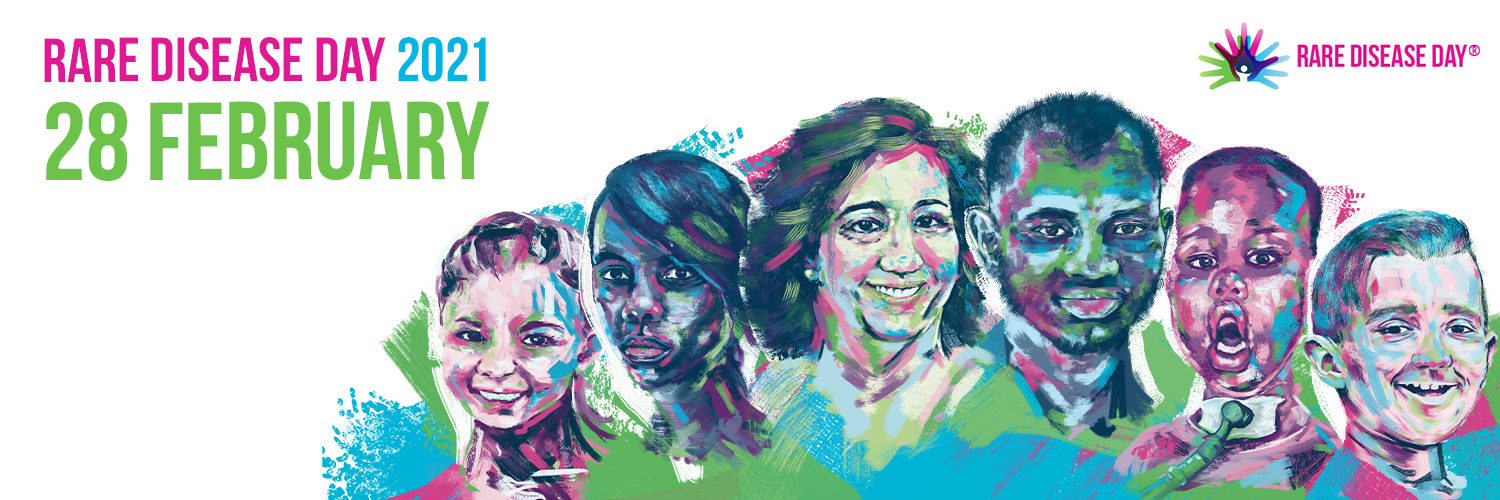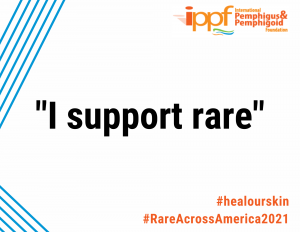Rare Disease Day and Rare Across America: 2021

We are rare, we are many,
we are strong, we are proud!
The purpose of Rare Disease Day® is to harness the creative energy of the millions of people around the world with rare diseases — and the millions who care about them — to raise awareness and generate action.
Join the IPPF and get in on the action. Rare Disease Day is the biggest day of the year for rare diseases like pemphigus and pemphigoid. Get involved and make an impact by attending the following webinars/virtual meetings, interacting on social media, and taking action!
National Advocacy Events:
Monday, 3/1 10:30am- 5:30pm (EST)
Virtual Rare Disease Day at the National Institutes of Health NIH
Sponsored by the National Center for Advancing Translational Sciences (NCATS) and Clinical Center at the National Institutes of Health (NIH), Rare Disease Day at NIH aims to raise awareness about rare diseases, the people they affect, and NIH research collaborations underway to address scientific challenges and to advance new treatments.
Friday, 3/5 9:00am- 4:00pm (EST)
FDA’s Rare Disease Day 2021 (virtual)
The purpose of this meeting is to highlight strategies to support rare disease product development. Patients, patient advocates, researchers, and medical product developers may benefit from attending this public meeting on rare disease product development. Register on the FDA website.
State Advocacy Events:
Many states are hosting Rare Disease Day Events in February and early March. Visit the National Organization for Rare Disorders Event Page to register.
(Arizona, Arkansas, California, Colorado, Connecticut, Delaware, Florida, Georgia, Illinois, Indiana, Kansas, Louisiana, Maine, Massachusetts, Minnesota, Michigan, Nevada, New Hampshire, New Jersey, New York, North Carolina, Ohio, Oklahoma, Pennsylvania, South Carolina, Tennessee, Texas, Utah, Virginia, West Virginia)
Rare Across America (2/22- 3/5)

The IPPF is excited to participate in Rare Across America virtually this year. Rare advocates have already signed up and will be sharing their stories to make an impact on federal policy. Rare Disease Legislative Advocates (RDLA) organizes meetings for rare disease advocates with their Members of Congress and/or the Member’s staff. Meetings will take place virtually on March 3rd and 4th. The RDLA team also helps to prepare advocates for their meetings, provides legislative resource materials, and hosts pre-meeting training webinars.
Social Media:

An easy way to spread disease awareness and make an impact is through sharing messages on social media! Raise awareness for the IPPF community and rare diseases by liking and sharing IPPF social media posts or creating your own.
Monday, 2/22- Friday 2/26: Selfie Week – Post a picture on social media, tag the IPPF (@healourskin), and use these hashtags: #RareAcrossAmerica2021, #EveryVoiceMatters, #healourskin, #RareDiseaseDay2021, #ShowYourStripes
Download the IPPF Rare Disease Awareness Social Media Toolkit for images to use.
Friday, 2/26: Share Your Rare Story – Take a video and share it on social media. Don’t forget to tag the IPPF (@healourskin) and use these hashtags: #healourskin #RareAcrossAmerica2021, #EveryVoiceMatters, #RareDiseaseDay, #ShowYourStripes
Check out the National Organization for Rare Disorders (NORD) social media toolkit to find helpful tips, sample social media posts to share, graphic design templates, hashtags to use, and profiles to tag.
Take Action
The RISE Act
Take action by urging Congress to secure our nation’s strategically vital science and technology ecosystem: pass and sign into law the RISE Act, and designate at least $25 billion in supplemental funding – including at least $10 billion for the NIH – for research recovery.
Representatives Diana DeGette (D-CO) and Upton were joined by 75 of their colleagues in introducing the Research Investment to Spark the Economy (RISE) Act. Senators Edward Markey (D-MA) and Thom Tillis (R-NC), joined by Senators Gary Peters (D-MI) and Susan Collins (R-ME), introduced a companion bill in the Senate. Read Research America’s statement detailing the crucial importance of the RISE Act .
Congressional Caucus
The IPPF urges you to contact your Members of Congress and ask them to join the Rare Disease Congressional Caucus.
A congressional caucus is a group of members of the United States Congress that meets to pursue common legislative objectives. Formally, caucuses are formed as congressional member organizations (CMOs) through the United States House of Representatives and governed under the rules of that chamber. There are hundreds of Caucuses. The most common caucuses consist of members united as an interest group. A Caucus can hold briefings to raise awareness on an issue. However, briefings are not actionable, ie: no bills can be introduced or voted on. A Caucus may join Members together in a voting block to support or oppose legislation, however most interest group caucuses are used to gain media attention and raise public awareness. Congressional Caucuses must be re-filed in the House at the start of each new Congress. The filing papers must be submitted by the majority party.
Together, we can drive favorable policies by reaching out to legislators and decision-makers to inform them of our public policy concerns, bring attention to the disease, and inform the public about pemphigus and pemphigoid.
The HEART Act
The IPPF needs your help to get a vital piece of legislation passed! We work collectively with other rare and ultra-rare groups to increase our voice and make a difference. Sharing our patients’ experiences with the Haystack Project has resulted in an especially important bill being re-introduced this year with the new Congress. This bill will have a significant and lasting impact for our community.
The HEART Act, H.R. 1184, contains tangible and practical solutions for involving patients and rare disease experts in the FDA review process to better inform the review of drugs for safety and efficacy.
The HEART Act contains 5 provisions critical to rare patients:
1. Advisory Committees – Require a rare/ultra-rare expert in the science of small population studies at Advisory Committee meetings when the application under review is for a low prevalence condition.
2. Review Division Transparency – Require annual report to Congress that sets out, by division, how many rare applications were reviewed, Agency actions, and the prevalence #s for that rare condition (this could be pulled from sponsor submission on orphan designation request.)
3. Review Division Support – Require review divisions to consistently include Rare Disease Program staff as an integral part of review team when reviewing a first drug/biologic or a first disease modifying agent for a particular indication associated with an orphan condition with very low prevalence (not as a volunteer, advisor, or “guest” that can be removed if their participation is unwelcome). This same rare disease program staff support should be extended to support review division decisions beyond just approval to REMS, post market commitments, etc.
4. REMS – For any very low prevalence orphan applications, require FDA to consult with patients/patient organizations in devising or reviewing any Risk Evaluation and Mitigation Strategy (REMS) elements that require patient action/participation.
5. European System – Require a Government Accountability Office (GAO) study of how the European system reviews ultra-rare applications and its applicability in the US — Specifically, how the EU allows submission of updated data during the review, including from open label extension studies for patients who remain/continue on drug or cross-over from a control arm after clinical trial data has been gathered and submitted.
Ask your Congressional Representatives and Senators to support this bill easily and quickly:
